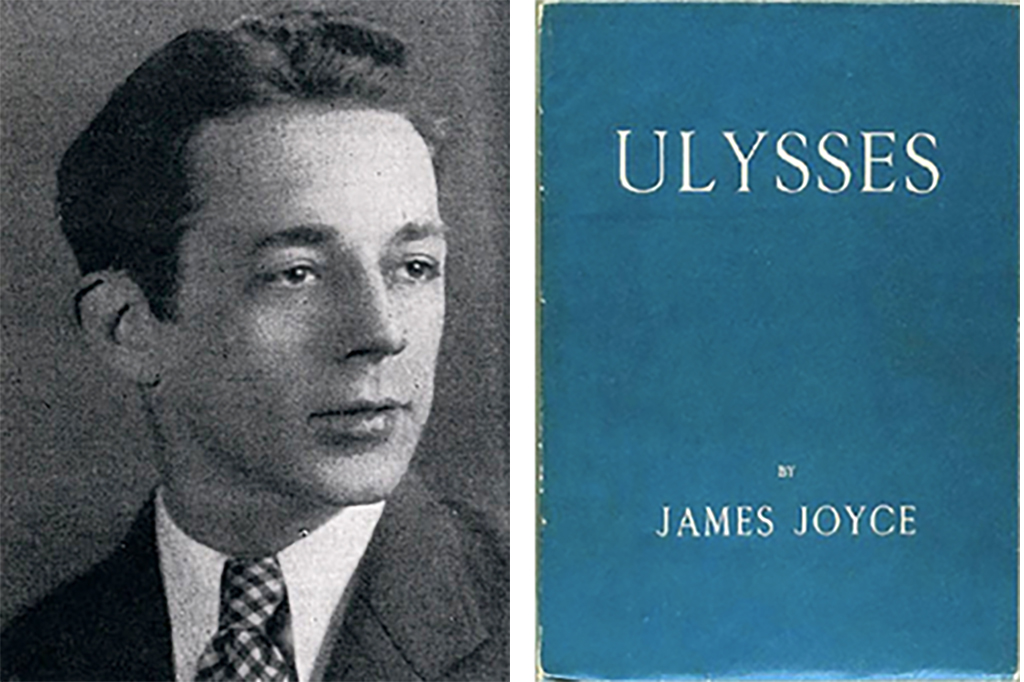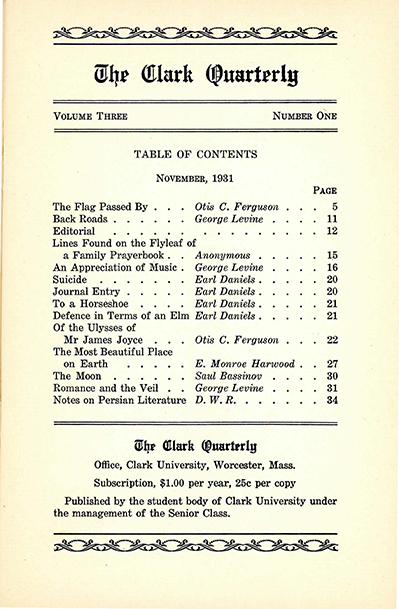Clarkives
On the Ulysses of Mr. James Joyce

It is deplorable that one of the great prose works of an age should be so frightfully hard to come at, especially when the age happens to have such a plethora of secondraters as the one we live in. As is usual, however, official stupidity has triumphed and James Joyce’s fine experiment in English is poison to the authorities of every country where the language is spoken. The ULYSSES has its quota of what you may be pleased to term vulgarity, to be sure. So has life got a quota. And any whinnying attempt to cleave only to what is “noble” in literature is going to land you in preciosity just so surely as its opposite tendency leads to the pornographic. To anyone who has read the work, it is perfectly obvious that the ULYSSES cannot be classified under this last head. No person less perverted than an authorized censor of public morals would dream of doing so.
I have made use of the term experiment. Joyce has chosen a vehicle which will allow him the utmost freedom and which will require the closest attention on the part of the reader — will put the reader to a deal of hard work. What does the reader get for his pains? Breadth and depth, a cross section of whatever is going on in the eternal huggermugger — not the words and deeds alone, which are surface, but their motivation, their effect. “An analysis of the stream of consciousness,” someone says. Now to be anything more than a melodramatist, a man must work in terms of these motivations and ultimate results. Dostoevsky, for instance, achieves the end, and at what loss of unity ! He is forced to go backward and forward and around an act time and again to make it possible. Joyce is unhampered by conventional makeshifts. Knowing that the mind is continually darting back, rummaging in experiences, peering ahead, he simply makes of the mind another voice in his chorus. Simply! You must pace very warily in threading such a maze as ULYSSES, and then only to fall flat on your face from time to time. But upon retracing your steps, you find that word and thought flow the more beautifully in the end for having sloughed off labels and signposts. And when it is over you feel the exhiliaration of having kept step with “a mind that has travelled.”
 On the other hand, it too often seems as though the author were playing hole and corner for the sheer joy of being obscure. He jumbles words and whoops down a page with scant regard for punctuation. He crackles about the ears of the pedagogue merely, you suspect, in hilarious derision. Not a little of this obfuscation could be cleared up without loss of artistic effect.
On the other hand, it too often seems as though the author were playing hole and corner for the sheer joy of being obscure. He jumbles words and whoops down a page with scant regard for punctuation. He crackles about the ears of the pedagogue merely, you suspect, in hilarious derision. Not a little of this obfuscation could be cleared up without loss of artistic effect.
One must bring to the ULYSSES an erudite as well as an agile mind, else much of the flavor will stay in the book. It is well nigh impossible to follow all of the allusions, for Mr. Joyce has not held exclusively to the beaten paths of literature. He is no whit embarrassed by his knowledge of Italian, French, Gaelic, Hebrew, Greek, and the jargon of piano movers. His reader, unfortunately, is.
Too much space has been devoted to the vehicle as such, whereas the thought, the color of the piece, give it its place in literature. Had Joyce cut into life with any other instrument the same sureness of hand and nice balance of mind would have been apparent. We are given no patent beverages, no illuminating explanations of “why Life?” or “whence Life?” but we feel the scope of it and the sweep of it and almost see it through the eyes of another-Stephen Dedalus, Marion Bloom, or Leopold. And can anything serve better for a perspective of life than its undistorted image on the mirror of a strange soul? For this is, you know, a real soul, or personality, or entity, or what you will.
And what a wealth of swelling prose is here to boom above the rattle of today’s literary small arms: marketable technique, professional cynicism, and the like. It smells of a time when writing was a matter of words and not of stale moods, nice academics, and popular fads. Joyce commands a rather amazing range. His style changes rapidly with his subject; to record salty colloquial diction, to paint a picture, to parody anything from tabloidal cant back to Langland, and beyond to the Old Testament. You are never certain of where this strange fell ow will bob up next, nor of whether he will be gibbering, or haggard with some persistent remorse. Yet always underneath you sense a steady seriousness and a drive.
But get the feel of it for yourself-the lordship of language is hardly a state of admitting of description:
He watched her pour into the measure and thence into the jug rich w’hite milk, not hers. Old shrunken paps. She poured again a measureful and a tilly. Old and secret she had entered from a morning world, maybe a messenger. She praised the goodness of the milk, pouring it out. Crouching by a patient cow at daybreak in the lush field, a witch on her toadstool, her wrinkled fingers quick at the squirting dugs. They lowed about her whom they knew, dewsilky cattle. Silk of the kine and poor old woman, names given her in old times. A wandering crone, lowly form of an immortal serving her conqueror and her gay betrayor, their common cuckquean, a messenger from the secret morning.
And on a brisker note:
Airs romped around him, nipping and eager airs. They are coming, waves. The whitemaned seahorses, champing, brightwindbridled, the steeds of Mananaan…
Joyce has a taste for the literary heresy of allowing his prose to become so rhythmical as to be no longer prose, and not always without effect, as in the following touch of well-fed pageantry:
… the snorted Latin of J ackpriests moving burly in their albs, tonsured and oiled and gelded, fat with the fat of kidneys of wheat …
Or still more noticeably:
… the colddomed room of the tower waits. Through the barbacans the shafts of light are moving ever, slowly ever as my feet are sinking, creeping duskward over the dial floor. Bluedusk, nightfall, deep blue night, in the darkness of the dome they wait.
At satire Joyce has an exuberance of his own, evident in the caricature of the prose poem idea which I quote. It runs hand in glove with some fine colloquial narration and is loosely allied to its theme:
— Come around to Barney Kiernan’s, says Joe. I want to see the citizen.
In Inisfall the fair there lies a land, the land of holy Michan. There rises a watchtower beheld of men afar. There sleep the mighty dead as in life they slept, warriors and princes of high renown. A pleasant land it is in sooth of murmuring waters, fishful streams where sport the grilse, the dab, the brill, the flounder, the mixed coarse fish generally and other denizons of the aqueous kingdom …
And there rises a shining palace whose crystal glittering roof is seen by mariners who traverse the extensive sea in barks built expressly for that purpose and thither come all herds and fatlings and first fruits of that land for O’Connell Fizimmon takes toll of them all, a chieftain descended from chieftains.
—I dare him, says he, and I doubledare him. Come out there Geraghty, you notorious bloody hill and dale robber!
And by that way wend the herds innumerable of bellwethers and flushed ewes and shearling rams and lambs and stubble geese …
So we turned into Barney Kiernan’s and there sure enough was the citizen up in the corner having a great confab with himself and that bloody mangy mongrel, Garry-owen, and he waiting for what the sky would drop in the way of drink …
The bloody mongrel let a grouse out of him would give you the creeps. Be a corporal work of mercy if somebody would take the life of that bloody dog. I’m told for a fact he ate a good part of the breeches off a constabulary man in Santry that came around one time with a blue paper about a license.
The narrative goes on, the satire turning now on the sober exaggeration of the press:
Begob he drew his hand and made a swipe and let fly. Mercy of God the sun was in his eyes or he’d have left him for dead. Gob, he near sent it into the county Longford. The bloody nag took fright and the old mongrel after the car like bloody hell and all the populace shouting and laughing and the old tinbox clattering down the street.
The catastrophe was terrific and instantaneous in its effect. The observatory of Dunsink registered in all seven shocks, all of the first degree of Mercalli’s scale, and there is no record extant of a similar seismic disturbance …
All of which is no adequate index of the work in question. There could be none. While the excerpts are typical, they are by no means the best of Joyce, but of necessity copied at random and in haste, as you may be sure I had the book only for a short time. The best of the ULYSSES is not something you can put a finger on. It extends from cover to cover. It has largeness, and reminds one of Sterne, of Rabelais, and of Shakespeare. That the last mentioned is predominant in influencing Joyce (certainly a close student, as witness the chapter on Hamlet), you cannot help seeing. Nor can you help the conviction that here is a man worthy of such a master.

